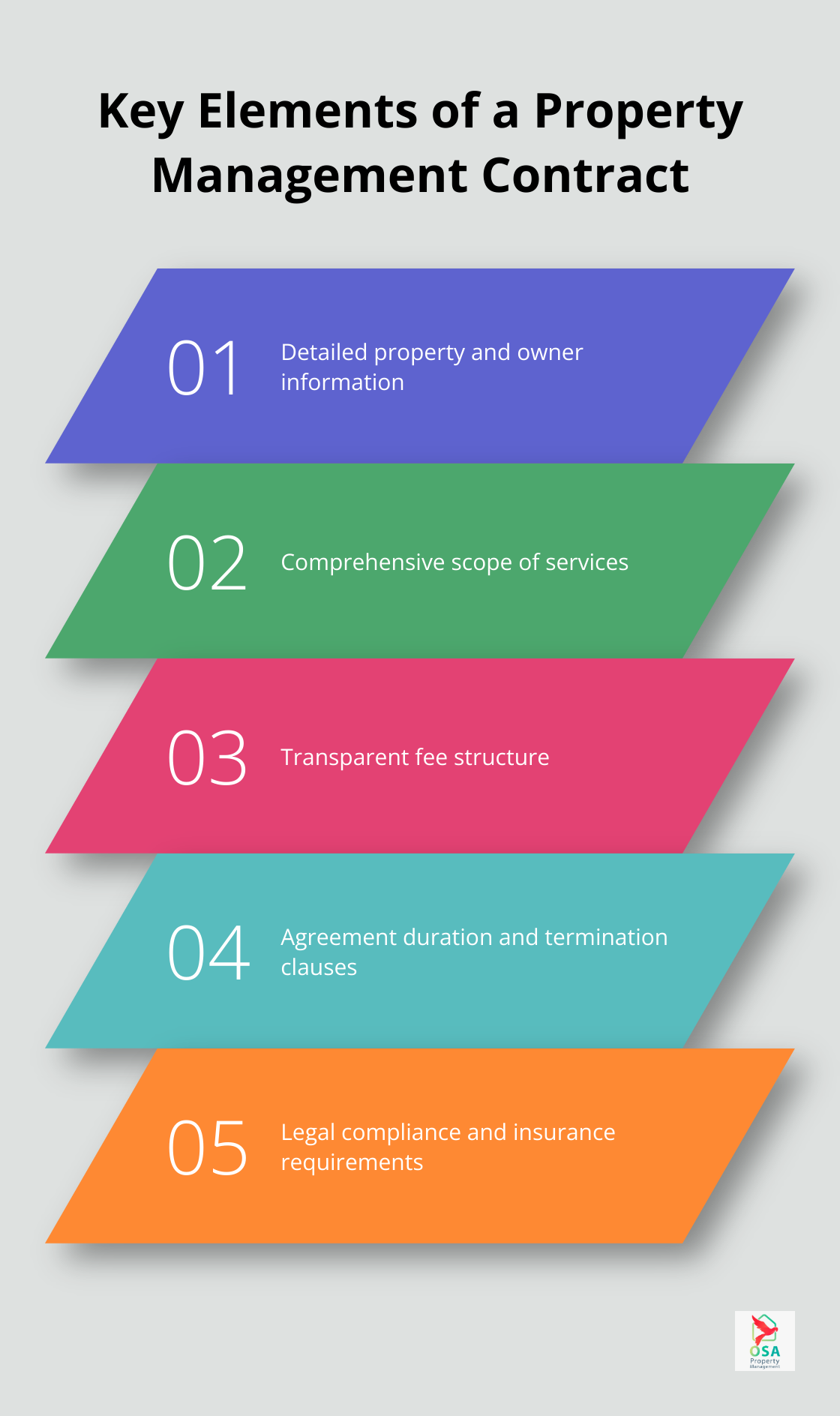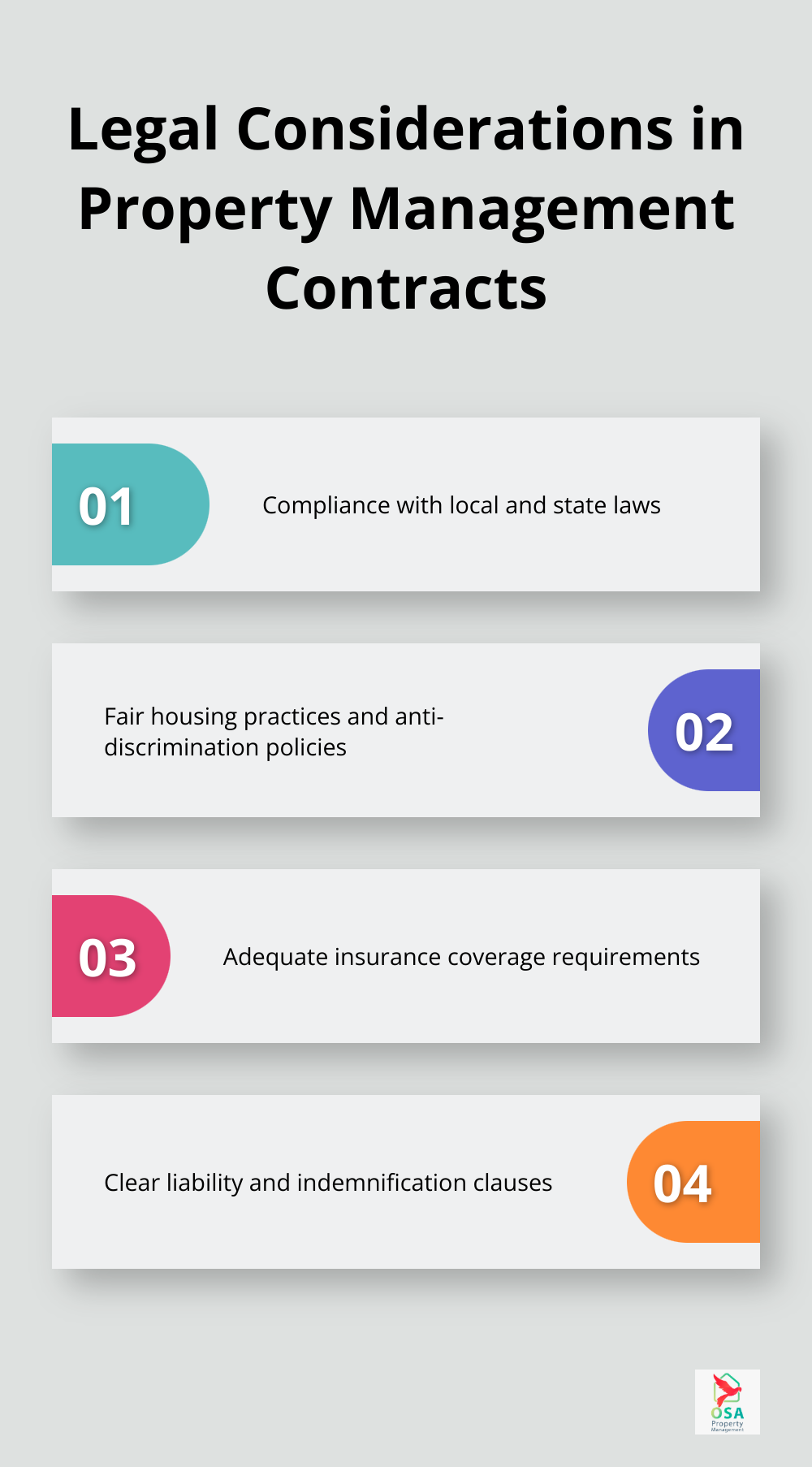At Osa Property Management, we know that a well-crafted property management contract is the foundation of a successful partnership between property owners and managers.
This essential document outlines the rights, responsibilities, and expectations of both parties, helping to prevent misunderstandings and disputes down the line.
In this blog post, we’ll guide you through the key elements of a solid property management contract and share tips on how to customize it to your specific needs.

What Should a Property Management Contract Include?
A comprehensive property management contract forms the foundation of a successful partnership between property owners and managers. A well-crafted agreement prevents misunderstandings and sets the stage for a smooth, profitable relationship.
Detailed Property and Owner Information
The contract must start with a clear description of the property, including its address, unique features, and specific management requirements. This section should also include the property owner’s full name, contact information, and preferred method of communication. Thoroughness here can save countless headaches down the line.
Comprehensive Scope of Services
The contract must outline the specific responsibilities of the property manager. This typically includes tasks like tenant screening, rent collection, maintenance coordination, and financial reporting. Specificity is key. For example, instead of simply stating “handle maintenance,” the contract should specify that the manager will “respond to maintenance requests within 24 hours and coordinate repairs with approved vendors.”
Transparent Fee Structure
The agreement must clearly define all fees associated with the management services. This should include the base management fee (often a percentage of monthly rent), as well as any additional charges for services like lease renewals, evictions, or major repairs. Full transparency when it comes to fees builds trust and prevents surprises for property owners.
Agreement Duration and Termination Clauses
The contract must specify the length of the management agreement and the conditions under which either party can terminate the contract. Most agreements run for one to two years, with options for renewal. Details on the notice period required for termination (typically 30 to 60 days) and any penalties for early termination should be included.
Legal Compliance and Insurance Requirements
The contract must address compliance with local, state, and federal laws, including fair housing regulations. It should specify the types and amounts of insurance required for both the property manager and the owner. Key components of property management contracts include legal compliance and how a solid contract protects your property investment.
A solid property management contract sets clear expectations and protects the interests of both parties. While templates can provide a good starting point, it’s essential to tailor the agreement to specific needs and local regulations. The next section will explore the legal considerations and compliance aspects that every property management contract should address.

Navigating Legal Complexities in Property Management Contracts
Local and State Laws: A Foundation for Compliance
Property management contracts must adhere to a complex web of legal requirements. Laws vary significantly by location. In Costa Rica, regulations differ from those in the United States or Europe. Costa Rican law mandates all rental agreements to be in writing and registered with the National Registry. Property managers must familiarize themselves with local zoning laws, tenant rights, and eviction procedures. Non-compliance can result in substantial fines or legal disputes.
Fair Housing Compliance: Ensuring Equality
Fair housing laws prohibit discrimination in housing-related activities. In Costa Rica, compliance with anti-discrimination laws is essential, prohibiting discrimination based on race, religion, nationality, or other factors. Contracts should explicitly state a commitment to fair housing practices. This includes non-discriminatory tenant screening processes and equal treatment in property maintenance and dispute resolution. Property managers must implement and document these practices to avoid potential legal issues.
Insurance Requirements: Protecting Investments
Adequate insurance coverage protects both property managers and owners. Contracts should specify required insurance types and coverage amounts. This typically includes property insurance, liability insurance, and sometimes specialized coverage (like flood insurance in coastal areas). Contracts should clearly delineate responsibilities for maintaining insurance policies and require annual proof of insurance from property owners.
Liability and Indemnification: Defining Responsibilities
Liability clauses protect both parties from potential legal issues. Well-crafted contracts include indemnification clauses, specifying scenarios where each party assumes responsibility. For example, property managers might be liable for damages resulting from negligence in property maintenance, while owners could be responsible for issues arising from undisclosed property defects. Clear language about dispute resolution processes should be included, often specifying mediation or arbitration as the first step in resolving conflicts (potentially saving time and legal fees compared to court proceedings).
Customization for Unique Properties
While these legal considerations form the backbone of property management contracts, each property presents unique challenges. The next section will explore how to tailor your contract to address specific property features and management needs, ensuring comprehensive coverage for your investment.

How to Customize Your Property Management Contract
At Osa Property Management, we understand that every property is unique. Customizing your property management contract addresses your specific requirements and maximizes the value of your investment.
Tailor Services to Your Property Type
The first step in customization considers your property type. A beachfront villa in Uvita will have different management needs compared to a condominium in Jaco. For luxury vacation rentals, your contract might include clauses for high-end concierge services, regular pool maintenance, and specialized marketing strategies to attract premium guests.
Long-term rental properties focus more on tenant screening processes, lease enforcement, and regular property inspections. Tailoring the services to your property type ensures you receive the most relevant and valuable management support.
Address Unique Property Features
Costa Rica’s diverse landscape means properties often come with unique features that require special attention. If your property has a private jungle trail, you might want to include regular trail maintenance in your contract. For properties with solar panels or other eco-friendly features, specify how these systems should be monitored and maintained.
In coastal areas like Manuel Antonio or Dominical, contracts should address specific concerns such as salt air corrosion prevention and hurricane preparedness. Clearly outlining how these unique features will be managed protects your investment and ensures proper maintenance of your property’s special attributes.
Incorporate Performance Metrics
To ensure your property manager meets your expectations, include performance metrics in your contract. These could include operational efficiency metrics such as staff to unit ratio and cost per unit, or guest experience metrics like the number of guest messages and calls.
You might specify that maintenance issues should be addressed within 24 hours, or that your vacation rental should maintain an average occupancy rate during peak season. Setting clear, measurable goals creates accountability and allows easy assessment of your property management service’s effectiveness.
Negotiate Special Clauses
Your contract should reflect your specific needs and preferences. This might include special clauses for pet policies, noise restrictions, or specific cleaning protocols. You can also negotiate clauses about communication frequency and methods, ensuring you stay informed about your property’s performance and any issues that arise.
Review and Update Regularly
Property management needs can change over time. Schedule regular reviews of your contract (annually or bi-annually) to ensure it continues to meet your needs. This allows you to adjust services, update performance metrics, or address new challenges that may have arisen.
Final Thoughts
A well-crafted property management contract forms the cornerstone of a successful partnership between property owners and managers. This comprehensive agreement prevents misunderstandings, sets clear expectations, and leads to a more profitable property management experience. Clear communication ensures both parties understand their roles, responsibilities, and the scope of services provided.
We recommend regular reviews of your property management contract to meet your evolving needs. As your property and the market change, your agreement should adapt. Annual reviews provide an opportunity to reassess performance metrics, adjust service levels, and address new challenges or opportunities.
A property management contract is a tool for success, not just a legal formality. Investing time in creating a thorough, customized agreement sets the stage for a productive, long-term relationship with your property manager. For expert guidance in crafting a contract tailored to your unique needs in Costa Rica, trust Osa Property Management.

